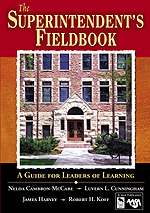Hands-on, Practical Guidance for Educators
From math,
literacy, equity, multilingual learners, and SEL, to assessment, school counseling,
and education leadership, our books are research-based and authored by experts
on topics most relevant to what educators are facing today.

Bestseller!
The Superintendent's Fieldbook
A Guide for Leaders of Learning
Learn how to navigate effectively through the new demands facing districts and schools!
The challenges for district leaders are constantly changing. Leadership and governance are only parts of the puzzle when other elements such as the NCLB legislation, budgets, and changing demographics are brought into the picture. Drawing on the experiences of nearly 200 superintendents, the authors identify seven key "commonplaces" of the successful superintendent including:
- Understanding and addressing standards and assessment
- Considering race, class, and the achievement gap
- Developing your schools' principals from building managers to leaders of learning
- Exploring collaborations with agencies of government and organizational allies
- Engaging your community to construct a shared vision of the future
Product Details
- Grade Level: PreK-12
- ISBN: 9781412906104
- Published By: Corwin
- Year: 2004
- Page Count: 368
- Publication date: August 10, 2004
Review Copies
This book is not available as a review copy.




